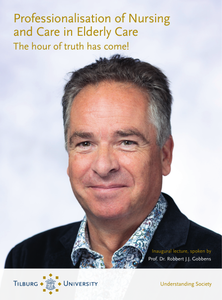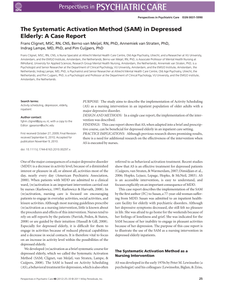Inaugural lecture, delivered upon public acceptance of the endowed professorship in Professionalisation of Nursing and Care in Elderly Care by Prof. Dr. Robbert J.J. Gobbens at Tilburg University on 29 September 2023.
DOCUMENT

Home rehabilitation after a hip operation can be daunting for the elderly. Lack of motivation to exercise and being insecure in the recovery process are common barriers. Personalized eHealth can help to ensure that the patient exercise efficiently, filling the gap between treatment in the practice with the physical therapist and practice at home.
DOCUMENT

The study aims to describe the implementation of Activity Scheduling (AS) as a nursing intervention in an inpatient population of older adults with a major depressive disorder. DESIGN AND METHODS: In a single case report, the implementation of the intervention was described. FINDINGS: This case report shows that AS, when adapted into a brief and prescriptive course, can be beneficial for depressed elderly in an inpatient care setting. PRACTICE IMPLICATIONS: Although previous research shows promising results, there is a need for additional research on the effectiveness of the intervention when AS is executed by nurses.
DOCUMENT

The proportion of elderly people in the society is constantly growing. The elderly who live alone form one of the most vulnerable groups in the society that is also at considerable risk for poverty and social isolation. According to the last population census in Estonia (2011), 39.3% of the elderly (65+) lived alone. The ageing of the population is accompanied by novel challenges, among them especially the coping of the elderly living alone. In 2015, the research team at the Tallinn University School of Governance, Law and Society conducted a study to map Estonian community-based practices that are available for the elderly (65+), especially for those who live alone at home, and the way these practices support interdependent coping and prevent the need for institutional care. This study, based on qualitative and quantitative data collected in Estonian communities, suggests that cooperation between Estonian local governments and communities should be more effective and involve regular interaction. Promising practices include developing network-based community support models and broadening communication possibilities.
LINK
Abstract Background: Good dental hygiene is important to prevent or reduce frailty in the elderly. Research shows that 66% of elderly patients admitted to a nursing home have bad dental hygiene. During their stay, dental hygiene remains moderate to bad. To start addressing this issue, a group of students (nursing, occupational therapy, computer science and health care technology), part of an exchange collaboration facilitated through our Vitale Delta Research Program, have been researching 1) why caregivers struggle to give good dental hygiene, 2) which eHealth applications could support the (professional) caretakers and the elderly in performing appropriate dental hygiene, and 3) to develop an app to support dental hygiene.
DOCUMENT
The continuing aging of the population sparked off a public discussion on the extent of state care of elderly people. A historical evaluation of the Dutch system of family care is an essential part in the above discussion, especially regarding options like self-aid and 'mantelzorg'. Using population registers, household stutters of elderly people in the periode 1920-1940 were reconstructed for two different regions in the Netherlands. The most important conclusion of this investigation is that the Dutch elderly were, in most cases, living independently, as head (or wife of the head) of the household in which they were residing.
DOCUMENT
This paper describes the approach used to identify elderly people’s needs and attitudes towards applying ambient sensor systems for monitoring daily activities in the home. As elderly are typically unfamiliar with such ambient technology, interactive tools for explicating sensor monitoring –an interactive dollhouse and iPad applications for displaying live monitored sensor activity data– were developed and used for this study. Furthermore, four studies conducted by occupational therapists with more than 60 elderly participants –including questionnaires (n=41), interviews (n=6), user sessions (n=14) and field studies (n=2)– were conducted. The experiences from these studies suggest that this approach helped to democratically engage the elderly as end-user and identify acceptance issues.
DOCUMENT

The present study attempts to explore the field of creative music workshops with the elderly. A growing amount of research has been carried out into running (creative) workshops, and besides we know a lot about the elderly and ageing. The aim of this research is to gather knowledge on the merging of both subjects, creative music workshops with the elderly in the so-called ‘fourth age’. In particular, this research project has been carried out as a study of a potential professional field for musicians and music educators. For this reason the research objective is focused on the position of the workshop leader and what is needed to run creative music workshops with elderly in residential homes for the elderly successfully. We therefore aim to explore aspects connected to this practice such as entrepreneurship, musicianship and leadership.
DOCUMENT

BACKGROUND: Depression in later life is a common mental disorder with a prevalence rate of between 3% and 35% for minor depression and approximately 2% for Major Depressive Disorder (MDD). The most common treatment modalities for MDD are antidepressant medication and psychological interventions. Recently, Behavioral Activation (BA) has gained renewed attention as an effective treatment modality in MDD. Although BA is considered an easy accessible intervention for both patients and health care workers (such as nurses), there is no research on the effectiveness of the intervention in inpatient depressed elderly.The aim of study, described in the present proposal, is to examine the effects of BA when executed by nurses in an inpatient population of elderly persons with MDD. METHODS/DESIGN: The study is designed as a multi-center cluster randomized controlled trial. BA, described as The Systematic Activation Method (SAM) will be compared with Treatment as Usual (TAU). We aim to include ten mental health care units in the Netherlands that will each participate as a control unit or an experimental unit. The patients will meet the following criteria: (1) a primary diagnosis of Major Depressive Disorder (MDD) according to the DSM-IV criteria; (2) 60 years or older; (3) able to read and write in Dutch; (4) have consented to participate via the informed consent procedure. Based on an effect size d = 0.7, we intend to include 51 participants per condition (n = 102). The SAM will be implemented within the experimental units as an adjunctive therapy to Treatment As Usual (TAU). All patients will be assessed at baseline, after eight weeks, and after six months. The primary outcome will be the level of depression measured by means of the Beck Depression Inventory (Dutch version). Other assessments will be activity level, mastery, costs, anxiety and quality of life. DISCUSSION: To our knowledge this is the first study to test the effect of Behavioral Activation as a nursing intervention in an inpatient elderly population. This research has been approved by the medical research ethics committee for health-care settings in the Netherlands (No. NL26878.029.09) and is listed in the Dutch Trial Register (NTR No.1809).
DOCUMENT

Aim: The prevalence of age‐related malnutrition is increasing in almost all Western countries. Because of their expertise, dietitians should have a central role in the management of malnutrition. This review aimed to synthesise the literature on the role of the dietitian in the management of malnutrition in the elderly in comparison with other health professionals. Methods: In November 2018, a search of Embase, Medline Ovid, Cinahl Ebscohost, Cochrane Central, Web of Science and Google Scholar was undertaken using ‘dietitian’, ‘elderly’ and ‘malnutrition’ as the main search terms. Qualitative and quantitative empirical research studies that focussed on the role of dietitians as the (main) subject of the study were included. Data extraction and data synthesis were performed by the three authors using a thematic synthesis approach. Results: Three themes emerged from the coding and synthesis of the 21 included studies. The first theme demonstrates that other health professionals' time for, and knowledge of, screening policies negatively affects the role of the dietitian. The second theme demonstrates that the importance of nutritional care is acknowledged. However, this does not always imply familiarity with dietetics nor does it always mean that other health professionals think involving dietitians is worth the effort. The third theme demonstrates that issues of workload appeared to be especially important in crossing or guarding role boundaries. Conclusions: The role of dietitians in managing age‐related malnutrition is not always clear and coherent. Therefore, how dietitians shape their role to provide optimal management of malnutrition in the elderly is open to debate. https://doi.org/10.1111/1747-0080.12546 LinkedIn: https://www.linkedin.com/in/matthijs-fleurke-66279110/ https://www.linkedin.com/in/dorien-voskuil-9b27b115/
MULTIFILE
